#Creative writing problems
Text
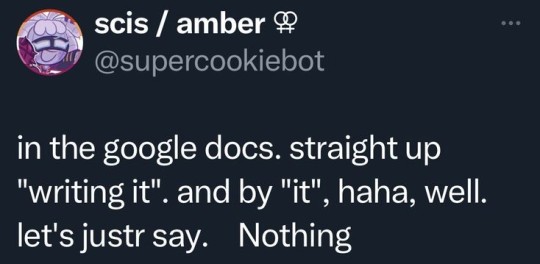
#fanfiction#writeblr#writer#writers#writing#writerscommunity#writblr#writer problems#writings#my writing#wip#write#being a writer#creative writing#female writers#fiction writing#just writer things#novel writing#writer life#writer meme#writer memes#writer struggles#writer stuff#writer things#writerblr#writers block#writers community#writers life#writers of tumblr#writers on tumblr
22K notes
·
View notes
Text
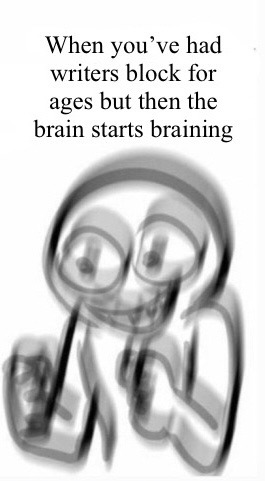
Keyboard go BRRRRRRRRRR
#writing#creative writing#writer#writers#writeblr#writeblogging#writer problems#writer memes#writing problems#writing memes#writeblr memes
21K notes
·
View notes
Text
Person: What's your book about?
Writers:

I'm both somehow 🙃
#writers on tumblr#writeblr#writing#creative writing#writing memes#writer memes#writer mood#writer problems#am writing#urban fantasy#paranormal romance#writer musings#just something that came to mind while I info dumped my poor mom
11K notes
·
View notes
Text
the great thing about being a fanfic writer: if there's a certain fanfic plot you can't find, you can make it yourself.
the terrible thing about being a fanfic writer: now you *have* to write that fanfic plot you can't find.
#writing#writing memes#fanfic writing#fanfic writer memes#creative writing#writer problems#fic writing problems#memes
11K notes
·
View notes
Text
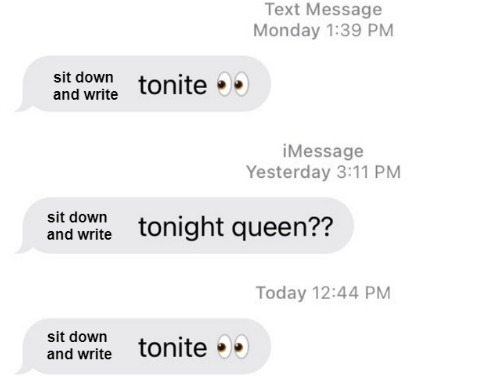
#writeblr#writing#writers#writblr#writers of tumblr#amwriting#writeblr community#writers on tumblr#writerscommunity#creative writing#writing memes#writing problems#writing funny#wip#wips
8K notes
·
View notes
Text
Things That May Be Causing Your Writer's Block- and How to Beat Them
I don't like the term 'Writer's Block' - not because it isn't real, but because the term is so vague that it's useless. Hundreds of issues all get lumped together under this one umbrella, making writer's block seem like this all-powerful boogeyman that's impossible to beat. Worse yet, it leaves people giving and receiving advice that is completely ineffective because people often don't realize they're talking about entirely different issues.
In my experience, the key to beating writer's block is figuring out what the block even is, so I put together a list of Actual Reasons why you may be struggling to write:
(note that any case of writer's block is usually a mix of two or more)
Perfectionism (most common)
What it looks like:
You write one sentence and spend the next hour googling "synonyms for ___"
Write. Erase. Write. Rewrite. Erase.
Should I even start writing this scene when I haven't figured out this one specific detail yet?
I hate everything I write
Cringing while writing
My first draft must be perfect, or else I'm a terrible writer
Things that can help:
Give yourself permission to suck
Keep in mind that nothing you write is going to be perfect, especially your first draft
Think of writing your first/early drafts not as writing, but sketching out a loose foundation to build upon later
People write multiple drafts for a reason: write now, edit later
Stop googling synonyms and save that for editing
Write with a pen to reduce temptation to erase
Embrace leaving blank spaces in your writing when you can't think of the right word, name, or detail
It's okay if your writing sucks. We all suck at some point. Embrace the growth mindset, and focus on getting words on a page
Lack of inspiration (easiest to fix)
What it looks like:
Head empty, no ideas
What do I even write about???
I don't have a plot, I just have an image
Want to write but no story to write
Things that can help:
Google writing prompts
If writing prompts aren't your thing, instead try thinking about what kind of tropes/genres/story elements you would like to try out
Instead of thinking about the story you would like to write, think about the story you would like to read, and write that
It's okay if you don't have a fully fleshed out story idea. Even if it's just an image or a line of dialogue, it's okay to write that. A story may or may not come out of it, but at least you got the creative juices flowing
Stop writing. Step away from your desk and let yourself naturally get inspired. Go for a walk, read a book, travel, play video games, research history, etc. Don't force ideas, but do open up your mind to them
If you're like me, world-building may come more naturally than plotting. Design the world first and let the story come later
Boredom/Understimulation (lost the flow)
What it looks like:
I know I should be writing but uugggghhhh I just can'tttttt
Writing words feels like pulling teeth
I started writing, but then I got bored/distracted
I enjoy the idea of writing, but the actual process makes me want to throw my laptop out the window
Things that can help:
Introduce stimulation: snacks, beverages, gum, music such as lo-fi, blankets, decorate your writing space, get a clickity-clackity keyboard, etc.
Add variety: write in a new location, try a new idea/different story for a day or so, switch up how you write (pen and paper vs. computer) or try voice recording or speech-to-text
Gamify writing: create an arbitrary challenge, such as trying to see how many words you can write in a set time and try to beat your high score
Find a writing buddy or join a writer's group
Give yourself a reward for every writing milestone, even if it's just writing a paragraph
Ask yourself whether this project you're working on is something you really want to be doing, and be honest with your answer
Intimidation/Procrastination (often related to perfectionism, but not always)
What it looks like:
I was feeling really motivated to write, but then I opened my laptop
I don't even know where to start
I love writing, but I can never seem to get started
I'll write tomorrow. I mean next week. Next month? Next month, I swear (doesn't write next month)
Can't find the time or energy
Unreasonable expectations (I should be able to write 10,000 words a day, right????)
Feeling discouraged and wondering why I'm even trying
Things that can help:
Follow the 2 min rule (or the 1 paragraph rule, which works better for me): whenever you sit down to write, tell yourself that you are only going to write for 2 minutes. If you feel like continuing once the 2 mins are up, go for it! Otherwise, stop. Force yourself to start but DO NOT force yourself to continue unless you feel like it. The more often you do this, the easier it will be to get started
Make getting started as easy as possible (i.e. minimize barriers: if getting up to get a notebook is stopping you from getting started, then write in the notes app of your phone)
Commit to a routine that will work for you. Baby steps are important here. Go with something that feels reasonable: every day, every other day, once a week, twice a week, and use cues to help you remember to start. If you chose a set time to write, just make sure that it's a time that feels natural to you- i.e. don't force yourself to writing at 9am every morning if you're not a morning person
Find a friend or a writing buddy you can trust and talk it out or share a piece of work you're proud of. Sometimes we just get a bit bogged down by criticism- either internal or external- and need a few words of encouragement
The Problem's Not You, It's Your Story (or Outline (or Process))
What it looks like:
I have no problems writing other scenes, it's just this scene
I started writing, but now I have no idea where I'm going
I don't think I'm doing this right
What's an outline?
Drowning in documents
This. Doesn't. Make. Sense. How do I get from this plot point to this one?!?!?! (this ColeyDoesThings quote lives in my head rent free cause BOY have I been there)
Things That Can Help:
Go back to the drawing board. Really try to get at the root of why a scene or story isn't working
A part of growing as a writer is learning when to kill your darlings. Sometimes you're trying to force an idea or scene that just doesn't work and you need to let it go
If you don't have an outline, write one
If you have an outline and it isn't working, rewrite it, or look up different ways to structure it
You may be trying to write as a pantser when you're really a plotter or vice versa. Experiment with different writing processes and see what feels most natural
Study story structures, starting with the three act structure. Even if you don't use them, you should know them
Check out Ellen Brock on YouTube. She's a professional novel editor who has a lot of advice on writing strategies for different types of writers
Also check out Savage Books on YouTube (another professional story editor) for advice on story structure and dialogue. Seriously, I cannot recommend this guy enough
Executive Dysfunction, Usually From ADHD/Autism
What it looks like:
Everything in boredom/understimulation
Everything in intimidation/procrastination
You have been diagnosed with and/or have symptoms of ADHD/Autism
Things that can help:
If you haven't already, seek a diagnosis or professional treatment
Hire an ADHD coach or other specialist that can help you work with your brain (I use Shimmer; feel free to DM me for a referral)
Seek out neurodiverse communities for advice and support
Try body doubling! There's lot's of free online body doubling websites out there for you to try. If social anxiety is a barrier, start out with writing streams such as katecavanaughwrites on Twitch
Be aware of any sensory barriers that may be getting in the way of you writing (such as an uncomfortable desk chair, harsh lighting, bad sounds)
And Lastly, Burnout, Depression, or Other Mental Illness
What it looks like:
You have symptoms of burnout or depression
Struggling with all things, not just writing
It's more than a lack of inspiration- the spark is just dead
Things that can help:
Forget writing for now. Focus on healing first.
Seek professional help
If you feel like it, use writing as a way to explore your feelings. It can take the form of journaling, poetry, an abstract reflection of your thoughts, narrative essays, or exploring what you're feeling through your fictional characters. The last two helped me rediscover my love of writing after I thought years of depression had killed it for good. Just don't force yourself to do so, and stop if it takes you to a darker place instead of feeling cathartic
#writing#creative writing#writer problems#writing advice#writing community#writing a book#writing problems#novel writing#on writing#writing tips#writing help#writers on tumblr#writers block#female writers#writers of tumblr#writers blog#adhd writer
18K notes
·
View notes
Text

is this relatable for anyone else…
#writers on tumblr#writerscommunity#writing#writeblr#creative writing#writing memes#writing problems#writing process#original character#character design#meme#writers
7K notes
·
View notes
Text
HOW TO GIVE PERSONALITY TO A CHARACTER
Giving personality to a character is an essential part of character development in storytelling, whether you're writing a novel, screenplay, or creating a character for a role-playing game. Here are some steps and considerations to help you give personality to your character:
Understand Their Backstory:
Start by creating a detailed backstory for your character. Where were they born? What were their childhood experiences like? What significant events have shaped their life? Understanding their past can help you determine their motivations, fears, and desires.
2. Define Their Goals and Motivations:
Characters often become more interesting when they have clear goals and motivations. What does your character want? It could be something tangible like a job or a romantic relationship, or it could be an abstract desire like happiness or freedom.
3. Determine Their Strengths and Weaknesses:
No one is perfect, and characters should reflect this. Identify your character's strengths and weaknesses. This can include physical abilities, intellectual skills, and personality traits. Flaws can make characters relatable and three-dimensional.
4. Consider Their Personality Traits:
Think about your character's personality traits. Are they introverted or extroverted? Shy or outgoing? Kind or selfish? Create a list of traits that describe their character. You can use personality frameworks like the Myers-Briggs Type Indicator or the Big Five Personality Traits as a starting point.
5. Give Them Quirks and Habits:
Quirks and habits can make a character memorable. Do they have a specific way of speaking, a unique fashion style, or an unusual hobby? These details can help bring your character to life.
6. Explore Their Relationships:
Characters don't exist in isolation. Consider how your character interacts with others. What are their relationships like with family, friends, and enemies? These relationships can reveal a lot about their personality.
7. Show, Don't Tell:
Instead of explicitly telling the audience about your character's personality, show it through their actions, dialogue, and decisions. Let the reader or viewer infer their traits based on their behavior.
8. Create Internal Conflict:
Characters with internal conflicts are often more engaging. What inner struggles does your character face? These can be related to their goals, values, or past experiences.
9. Use Character Arcs:
Consider how your character will change or grow throughout the story. Character development is often about how a character evolves in response to the events and challenges they face.
10. Seek Inspiration:
Draw inspiration from real people, other fictional characters, or even historical figures. Study how people with similar traits and backgrounds behave to inform your character's actions and reactions.
11. Write Dialogue and Inner Monologues:
Writing dialogue and inner monologues from your character's perspective can help you get inside their head and understand their thought processes and emotions.
12. Consider the Setting:
The setting of your story can influence your character's personality. For example, a character who grows up in a war-torn environment may have a different personality than one raised in a peaceful, affluent society.
13. Revise and Refine:
Don't be afraid to revise and refine your character as you write and develop your story. Characters can evolve and change as the narrative unfolds.
Remember that well-developed characters are dynamic and multi-faceted. They should feel like real people with strengths, weaknesses, and complexities. As you write and develop your character, put yourself in their shoes and think about how they would react to various situations. This will help you create a compelling and believable personality for your character.
#writeblr#writing advice#creative writing#writerscommunity#writer problems#writing resources#writing community#writers on tumblr#writers block#the writer struggle#writing tips#writers#uservolkova
12K notes
·
View notes
Text
How To (Realistically) Make A Habit Of Writing
To clarify: Works with my autism. WORKS WITH MY AUTISM!!! I’ve been meeting my goals since I made them my New Year’s resolution! Anyway I’m so sick of all those ‘how to’ guides that don’t actually tell you what the process is they’re just like ‘just do it, but don’t burn yourself out, do what’s best for you!’ because you’re not telling me what I’m not supposed to be burning myself out over but okay, so I made my own. Hope this helps
1. Choose your fighter metric. What works better for you as a measurement of your progress; time spent writing or your word count? Personally I get very motivated and encouraged by seeing my word count go up and making a note of where it should be when I’m done, so I measure by that. At the same time, a lot of people are also very discouraged by their word count and it can negatively impact their motivation to write, and in that case you may be better off working from how much time you spend writing rather than where the word count is
2. Choose your starter Pokémon time frame. How often can you write before it starts to feel like a chore or a burden rather than something fun you look forward to? Many people believe that they have to write daily, but for some people this can do more harm than good. Maybe every two or three days? Weekly? Figure out what fits your schedule and go with it
3. Choose your funny third joke goal. Now that you’ve got your chosen time frame to complete your goal in, what’s a reasonable goal to aim to complete within that time frame based on the metric you chose? If your metric is your word count, how much can you reasonably and consistently write within your chosen time frame? If your metric is time spent writing, how much time can you reasonably and consistently spend writing within that time? Maybe 1000 words per week works, or maybe 10 minutes per day? The goal here is to find something that works for you and your own schedule without burning you out
4. Trial and error. Experiment with your new target and adapt it accordingly. Most people can’t consistently write 1667 words per day like you do in NaNoWriMo, so we want to avoid that and aim somewhere more reasonable. If you feel like it’s too much to do in such a short time frame, either give yourself less to do or more time to do it in. If you find yourself begrudgingly writing so often that it constantly feels more like a chore than something fun, maybe consider adapting things. And if you think that you gave yourself too much wiggle room and you could do more than this consistently, give yourself more of a challenge. Everything needs to suit you and your pace and needs
5. Run your own race. Don’t feel like you’re not accomplishing enough in comparison to others or not working fast enough to satisfy some arbitrary feeling of doubt. Everybody works at their own pace and slower work doesn’t mean worse work. You could be on one word per day and you’ll still see consistent results, which is still one word per day more than you could originally count on. All progress is progress, regardless of its speed
#habits#writing habits#writing#writers#writeblr#bookblr#book#writers on tumblr#writerscommunity#my writing#writers of tumblr#writer#how to write#on writing#creative writing#write#writers and poets#writblr#writer things#writing tips#writerscreed#writing is hard#writing advice#writing life#writer problems#writer stuff#female writers#queer writers#writersnetwork#writerblr
5K notes
·
View notes
Note
how do you write a liar?
How to Write Liars Believably
Language
The motive of every goal is the make the lie seem plausible while taking blame off the speaker, so liars will often project what they say to a third party: "Katie said that..."
Referring to third parties as "they" rather than he or she
In the case of a deliberate lie prepped beforehand, there will be an overuse of specific names (rather than pronouns) as the speaker tries to get the details right.
Overuse of non-committal words like "something may have happened"
Masking or obscuring facts like "to the best of my knowledge" and “it is extremely unlikely," etc.
Avoiding answers to specific, pressing questions
Voice
There's isn't a set tone/speed/style of speaking, but your character's speech patten will differ from his normal one.
People tend to speak faster when they're nervous and are not used to lying.
Body Language
Covering their mouth
Constantly touching their nose
fidgeting, squirming or breaking eye contact
turning away, blinking faster, or clutching a comfort object like a cushion as they speak
nostril flaring, rapid shallow breathing or slow deep breaths, lip biting, contracting, sitting on your hands, or drumming your fingers.
Highly-trained liars have mastered the art of compensation by freezing their bodies and looking at you straight in the eye.
Trained liars can also be experts in the art of looking relaxed. They sit back, put their feet up on the table and hands behind their head.
For deliberate lies, the character may even carefully control his body language, as though his is actually putting on a show
The Four Types of Liars
Deceitful: those who lie to others about facts
2. Delusional: those who lie to themselves about facts
3. Duplicitious: those who lie to others about their values
Lying about values can be even more corrosive to relationships than lying about facts.
4. Demoralized: those who lie to themselves about their values
Additional Notes
Genuine smiles or laughs are hard to fake
Exaggerations of words (that would normally not be emphasized) or exaggerated body language
Many savvy detectives ask suspects to tell the story in reverse or non-linear fashion to expose a lie. They often ask unexpected, or seemingly irrelevant questions to throw suspects off track.
#writers block#writing#writers and poets#creative writing#writers on tumblr#creative writers#helping writers#let's write#poets and writers#writeblr#resources for writers#writers of tumblr#writers life#writers community#writerscommunity#writer things#writing practice#writing prompt#writing community#writing inspiration#writing advice#writing tips#on writing#writer#writing questions#writing quotes#writing problems#writing process#writing progress
5K notes
·
View notes
Text
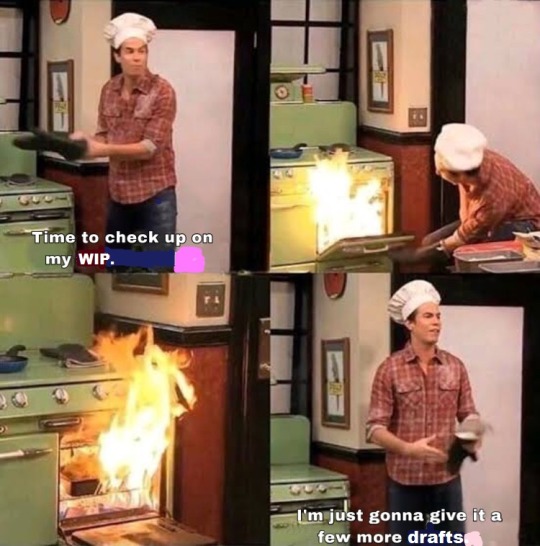
#writblr#writers on tumblr#writing community#writers of tumblr#WIPs#creative writing#writer#writers#writeblr#writing problems#writing process#writing meme#writing memes#queue
4K notes
·
View notes
Text
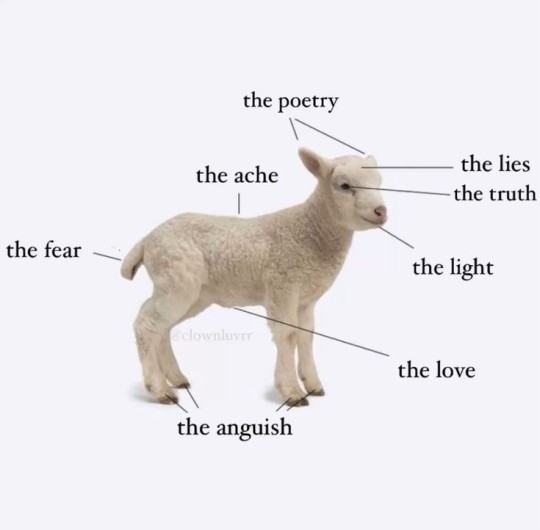
This is me btw
#beginner writer#literary fiction#poets corner#poetry blog#poems#story writing#writer#creative writing#author#writer problems#dark academia#poetic#prose#poet#poem#poetry#bookworm#book quotes#books#art#aesthetic#words#quotes#girlblogging#blog#artists on tumblr#writers block#writing#female hysteria#female poets
3K notes
·
View notes
Text
Ways to solve the Why Can’t They Use Magic To Fix Everything problem:
•Magic has a cost. The more powerful the spell, the more it drains the caster’s life.
•’We tried that ages ago.The gods grew angry at our arrogance and stripped most of our powers away.’
•Magic is tied to the stars and planets. Its full potential can only manifest on certain astrological events.(And these are once-in-a-millennia type events)
•Only one will a pure heart and selfless intentions can use their full power.
•All magic users are descendants of a (god/spirit). As the years have gone by, the blood has become more diluted, and magic has grown weaker as a result.
•Spell casters can only cast (finite number of spells). They end up using their gift on trivial matters.
•’After the war, we realized the dangers that magic presented. And so we sealed it away, lest it destroy the world.’
•Everyone has magic. Trying to solve one problem is futile as it can be easily undone(often violently and with much destruction)
•inverse of the above: everyone has magic, but their powers are limited and (mostly) harmless.
•Individual, company, or nation has a monopoly on the only substance that can negate magic. As they rule the world, they have installed anti-magic devices everywhere.
•Individual, group, company, or nation has a monopoly on magic. To insure their grip on power, all magic users that do not submit to them are killed.
•An act of good will spawn one of evil. The use of fire will cause somewhere to grow cold and dark. And to save a life, one must sacrifice another.
•The only magic people have access to is Chaos Magic. No one uses it, for obvious reasons.
—••• •• ——• ——• • ••• —•• •• —•—• —•— ••— •••
#writing#creative writing#writing inspiration#writing problems#writing resources#writer#writers#writers and poets#magic#magic system#writer on tumblr#writeblr
4K notes
·
View notes
Text
Dialogue tips that actually work:
You are not writing a movie (ignore this if you are). The reader doesn't need to know every word the characters say for the duration of the story. Less is more.
Dialogue can happen within the prose. "And they awkwardky discussed the weather for five minutes" is way better than actually writing five pages of dialogue about the weather.
Balance your dialogues. Surprise yourself with a monosyllabic answe to a dialogue that's ten sentences long. Don't be afraid of letting your character use half a page for a reply or nothing at all!
Don't write accents phonetically, use slang and colloquialisms if needed.
Comma before "said" and no caps after "!?" unless it's an action tag. Study dialogue punctuation.
Learn the difference between action tags and dialogue tags. Then, use them interchangeably (or none at all).
Don't be afraid to use said. Use said if characters are just saying things, use another word if not. Simple. There's no need to use fancy synonyms unless absolutely necessary.
Not everyone talks the same way so it makes sense for your characters to use certain words more often than others. Think of someone who says "like" to start every sentence or someone who talks really slow. Be creative.
Use prose to slow down the pace during a conversation.
Skip prose to speed up the pace during a conversation.
#writing#fiction#writeblr#writers#amwriting#writing problems#fan fiction#amediting#books#creative writing#dialogue writing#dialogue#character tropes#character design
18K notes
·
View notes
Text
me, after clearing my schedule to write:
uhhhh it was raining... and dark (and also night) and um... cold i guess?? anyway, something dramatic~ happened
me, stuck in traffic on my way to work:
Rain tumbled through midnight leaves, casting the forest in liquid moonlight. A low growl shook the horizon. Death had come.
#writeblr#writers of tumblr#writer problems#writing#writers#creative writing#writeblr community#jgmartin#am writing#tumblr writers#original writing#writer community#writers and poets#writerscommunity#writer things#writers on tumblr#writerslife#writing blog#poetrycommunity#writing community#writing advice
10K notes
·
View notes
Text
I'm doing an experiment
Edit: Should've added smut. If smut is your top struggle and you want to or do write it, reblog and say so <3
#new lore#tumblr polls#my polls#polls#writing stuff#creative writing#writing characters#writing community#writing challenge#writing#writers of tumblr#creative writers#writers on tumblr#writerscommunity#writers and poets#writers#writer#writeblr#writing things#writing problems#story plot#story planning
3K notes
·
View notes